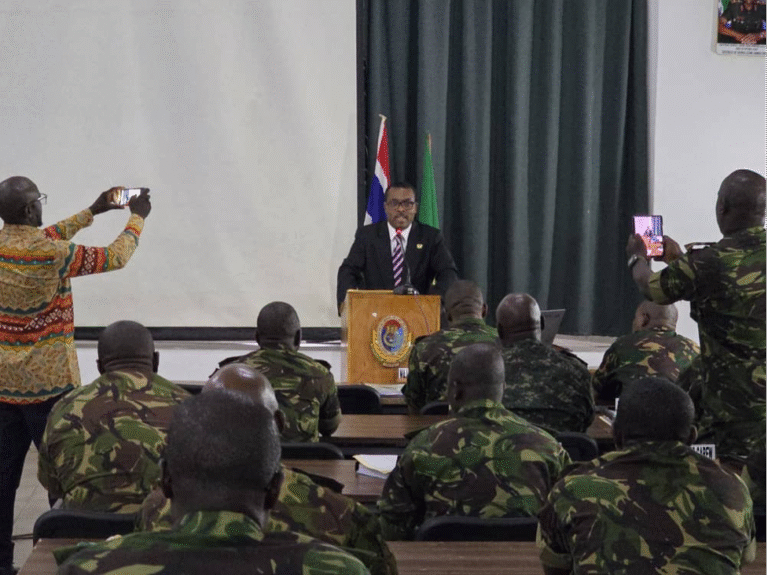26/7/2025
No one wants to visit a family to sympathize with them on the loss of loved ones. You want to visit a family to share in their joy. But yesterday, I was once again sympathizing with a family that lost 4 of its members in the flooding disaster on Wednesday.

Adama is no stranger to me. She had led me and walked by my side just a few months ago when I went to visit the home of a student from MGHS who had died in an accident. On that occasion, I parked my car near Adama’s house at Long Bench, at the top of Hennessy Street in New England. We then walked for another 30 minutes along a precarious route, climbing uphill on narrow stony paths, jumping over windy waterways, walking along the edge of footpaths carved in the hills. That was my first visit to Col Wata and I was shocked at how completely inaccessible this huge community was. With hundreds of homes and thousands of people living there, there was no road access at all! The first thought that came to mind and which I voiced out loud was “how can waste management services be delivered in this community given that there is no access?”. For the most part, the community waste is left in illegal dumpsites or emptied into the waterways, ending up in Freetown’s gutters and streets.

Sadly Col Wata is not an exception in our city, it is representative of over 55% of our built environment. The reason for this is that fact there is that no land use planning being done for the city. Prior to the allocation of land and the construction of structures, there is no mapping done for roads and drainages, nor is land space reserved for essential services such as water provision, health facilities and schools. Additionally, there isn’t an effective building permit regime that would ensure that access roads are protected from encroachment, that waterways are not blocked and that buildings are not erected in disaster prone areas. Construction in Freetown is largely unregulated – everyone builds what they want, where they want.

With a rapidly increasing population, fueled by rural-urban migration, the result of this absence of building controls in a hilly coastal city like Freetown, is disastrous. Formal and informal structures are springing on our hillsides and along our coastline at an alarming rate resulting in massive deforestation of terrestrial trees and mangroves. Our once tree covered green hills are turning brown as the current pace of deforestation is greater than the essential reforestation being done under Freetown City Council’s #FreetownTheTreeTown initiative. The absence of trees on the hills means that we experience severe runoff when it rains, with silt being washed down hill and our underground water tables not being replenished in spite of the heavy rainfall. The latter phenomenon leads to the heightened risk of water scarcity in the dry season.
Furthermore the practice of “banking” in order to construct homes on the hills undermines the stability of the slopes making them more susceptible to landslides. Along the coastline, “banking” destroys mangroves, increases pollution of the sea and leaves the resident population more susceptible to flooding. The lack of effective building regulations enforcement increases the risk of buildings and walls collapsing as we’ve experienced repeatedly in recent months.

And then there is climate change. Extreme weather events are occurring globally as seen from this snapshot of July reports from other countries around the world:
- A week of abnormally heavy monsoon rains and flash floods across Pakistan have killed at least 46 people. Officials have said to expect above-normal rains during this monsoon season, and that forecasters cannot rule out a repeat of extreme weather like the devastating floods in 2022 which inundated a third of the country and killed 1,737 people.
- At least 14 people are dead and 31 are missing following flash floods in the Mandi district of the Indian state of Himachal Pradesh in India.
- Swathes of China are on high alert for flash floods and landslides as unrelenting rain has triggered deadly disasters and forced evacuations in multiple provinces. More than 1,000 emergency personnel have been deployed to assist residents. Video footage from Guangxi showed a five storey building under construction collapsing into the river as the ground beneath it gave way in waterlogged soil. Beijing activated a citywide flood emergencyresponse on Wednesday, urging government agencies to monitor rainfall and prepare for flood prevention. Extreme rainfall is becoming more frequent and deadly due to human-induced climate breakdown. Last year, economic losses from similar storms in China exceeded USD$9.5bn.
- Heavy rains caused by the climate crisis caused natural disasters in 8 out of 10 Brazilian cities between 2020 and 2023, three times more than in the 1900s, according to a study published this week.Around 3.2 million people were affected on average each year, the report said, up from around 43,000 in the 1990s. The floods particularly affected the agriculture sector, which accounted for 47% of economic losses.
Here in Freetown, we have been advised by the Sierra Leone Met Office to expect above average rainfall this rainy season. Freetown City Council is undertaking our annual flood mitigation activities across the city as part of our #DortiMusGo campaign. But these flood mitigation efforts, incredibly useful as they are, will not address the root cause of our city’s challenges. The fundamental cause of Freetown’s challenges is the absence of land use planning, the absence of an effective building permit regime and the absence of enforceable building regulations. Listed below is a non-exhaustive list of some of the direct consequences of the absence of these functions:
- response to fire disasters is difficult and sometimes impossible due to lack of road access;
- negatively impacts the delivery of waste management services to the over 55% of Freetonians with no road access;
- makes transport networks limited as many communities can only be reached on foot;
- results in no zoning of the city and thus no distinction between residential, commercial and industrial areas in the city (shops and warehouses are now being built in what were previously residential areas);
- there is no designated land available for public amenities such as education and health facilities, water services and public toilets (FCC has had to enter into MOUs with private landowners in order to enable the ongoing construction of water kiosks and public toilets in communities);
- deforestation is indiscriminate and increasing;
- the risk of disasters such as landslides and flooding is severely heightened.
Yesterday as I sat on Adama’s verandah with her grieving family, I felt a deep sense of loss. Adama’s son Ali and her daughter-in-law Nancy lost their 1 year old daughter Ramatu. Her little body has still not been found and there were painful discussions about the possibility that she lay buried under mud or between rocks along the waterway. Nancy also lost her mother and her niece and nephew who were 2 years old and 8 years old respectively,
Yesterday I felt loss and I felt frustration. The mandates for land use planning, building permits and building regulations are held by the Ministry of Lands and not by the local councils. For the past 7 years I have been advocating for these mandates to be devolved to the local councils in accordance with international best practice. I am not suggesting that this will result in immediately solving all the current challenges we face as a city, but it will enable Freetown City Council and other local councils to have an integrated approach to city management. The functions of land use planning and building permits are globally recognized as local council functions because they directly impact on the delivery of municipal services, especially waste management but also on the beauty of the city and the sense of order within the city. Devolving the mandate for local councils to plan their localities will enable Freetown City Council to re-introduce zoning, to undertake regeneration of key areas of the city, to prevent construction of structures in waterways and on dangerously steep slopes and more. The devolution will not directly address road construction and road maintenance in the city as these are under the mandate of the Sierra Leone Roads Authority, but the anticipated consequent reduction of deforestation and the restoration of land cover will reduce the silt that is now constantly covering and destroying our roads.
The rapid population growth of Freetown could be curtailed by central government decentralizing more of its services and creating jobs in the regions outside of Freetown. A fulfillment of the government’s 2018 manifesto promise of setting up one factory in each district would be a good start towards reducing the attraction of permanently relocation to Freetown.
As I join Adama and her family in mourning the loss of their loved ones, I know that we can do better than this as a nation. Government must invest in the secondary cities, and must provide decent job opportunities for citizens outside of Freetown. It is imperative that the land bill currently in Parliament, that reinforces the existing Local Government Act’s proposed devolution of land use planning and development controls from the Ministry of Lands to the local councils, is passed and implemented fully and speedily. Provision must be made for affordable housing for our residents within a context that is appropriately planned for safety and productivity. As the climate crisis intensifies, we need to build greater resilience into our city to ensure that we reduce the risks to our residents and build a better future.
HopeToReality
©️Mayor Yvonne Aki-Sawyerr OBE







